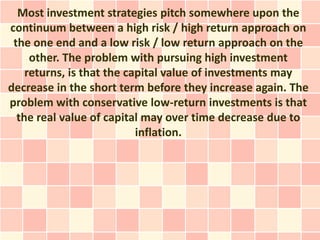
Investments - The Art Of High Risk Investing
- 1. Most investment strategies pitch somewhere upon the continuum between a high risk / high return approach on the one end and a low risk / low return approach on the other. The problem with pursuing high investment returns, is that the capital value of investments may decrease in the short term before they increase again. The problem with conservative low-return investments is that the real value of capital may over time decrease due to inflation.
- 2. The art of investing lies in finding the approach that suits you personally best. One should on the one hand try to maximise the return on capital, but at a risk level that is acceptable to you. The question is what is regarded as acceptable risk and, is the acceptability a constant factor that stays the same under any circumstances? The answer is no. More risk is acceptable under certain circumstances, but before these circumstances are discussed, it is necessary to discuss the following terms that will be used, that are often confused:
- 3. Saving
- 4. Saving is the action of putting money aside. It means that money is not spend, but is kept at the owners disposal.
- 5. Investing
- 6. Investing means that money is handed over to a third party for purchasing assets with the purpose of long term investment growth. Investors transfer the their funds with the intention that financial assets like shares and bonds or hard assets like diamonds are bought. Investing does not mean to hand money over to dubious schemes.
- 7. Gambling
- 8. To gamble is normally understood as "to play a game for money or other stakes" like putting money on a roulette wheel or buying a lotto ticket. It can also mean to buy a share that you know nothing about or investing in a scheme you don't understand.
- 9. Marketers of illegal schemes use the word "investing" to lure people to hand their money over to them. Initially, when "investors" receive high payouts, they think the scheme is the best investment thinkable. The fact that it has nothing to do with investment, only dawns on them when they lost all their money and it is to late to recover anything.
- 10. Speculation
- 11. Speculation means that a calculated risk are taken to make money on a relatively short term. One may for instance buy property with the purpose to sell it in a year or two at a higher price. The price of the property may not rise, but at least you have done sufficient homework to make sure that there is a high probability that it will rise.
- 12. Now that we are sure about the terms, we can look at the circumstances under which a higher risk may be appropriate.
- 13. Surplus income: The higher your surplus income, the higher the risk you should be able to handle in investing money.
- 14. Frequency of investment To invest a certain amount regularly, holds less risk than to invest a single amount at once.
- 15. Amount: If the amount you want to invest, is a small percentage of your total capital, you can accept greater risk.
- 16. Term: Greater risk can be handled with longer investment terms. Young people can therefore accept greater risk, but if the term of their financial objectives is shorter, investment portfolios should be structured less risky.
- 17. Income: If you receive an income from your investment, it should be structured more conservative with less risk. If you are not receiving an income at the moment, but plan to do so in future, you can decide to pursue a higher return till you need the income. When this happens, the investment could be restructured to reflect the new situation.
- 18. Investment experience: Investors with little investment experience should be more wary against risk than investors with lots of experience in this regard.
- 19. Dependants: Investors with more dependents should be more wary towards risk than those with few dependants.
- 20. Health: Healthy investors can handle more risk than unhealthy investors.
- 21. Diversification: An investor that already has a well diversified investment portfolio, can accept greater risk with new investments than investors with undiversified portfolios.
- 22. Timing: Share investments are normally more risky than some other investments. Investment risk can however be reduced if shares are bought when the economic cycle is on it's lowest. Risk can also be lowered if investors buy shares of strong well established companies with little debt and healthy balance sheets.
- 23. Emotional tolerance:Some people loves the adrenaline rush in going for high returns, with no regard to the risk. They are emotionally capable of doing it this way. For other, it is a nightmare if their investment fall by a single percentage point. One should therefore know how you will respond to sudden capital depreciation.
- 24. Summary
- 25. One's view on risk forms an extremely important element in investment planning. It is as irresponsible to take unnecessary risks as it is to be satisfied with a low return on your money. However, to pursue higher return, goes with the responsibility to research the investment opportunity thoroughly before parting with your money.